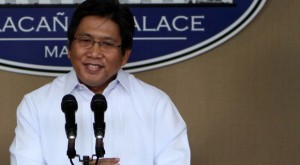MANILA, Philippines—The 2015 proposed budget may have incorporated an expanded definition on savings but Congress will still have to pass a joint resolution because projects previously funded by the Disbursement Acceleration Program (DAP) need to be continued, Malacañang said Thursday.
“We are still in 2014. We cannot wait for 2015,” Communications Secretary Herminio Coloma Jr. said in a briefing Thursday.
“Right now, there are projects that are already on stream. But if some portion has not been completed because the requisite funds have not been obligated, and this occurred after the rendering of the Supreme Court decision, then the government has decided to ask for a supplemental budget to be compliant with the Supreme Court resolution,” he added.
Coloma was referring to the Supreme Court decision declaring parts of the controversial DAP unconstitutional.
During his fifth State of the Nation Address (Sona), President Benigno Aquino III called on Congress to pass a joint resolution clarifying the definition of savings. He also said the Executive branch will file a proposed supplemental budget for the continuation of projects funded by the DAP.
After the said speech, Budget Secretary Florencio Abad told INQUIRER.net that the joint resolution should clarify the definition of savings and allow the funds to be utilized again.
He said only one out of the four issues raised by the high court pertained to the Constitution and that the others can easily be addressed by Congress.
Coloma said the definition of savings should be revised in accordance with the concept and definition of savings based on the Supreme Court decision.
Under the 2015 National Expenditure Program, “savings” may now also apply to portions available balances resulting from the non-commencement of a program or project for which the allotted amount was authorized within the first semester of 2015.
During his earlier speeches, Aquino assailed the Supreme Court for not allowing the Executive to access savings after the first half of the year. He questioned why government must wait until the end of the year to access unutilized funds.
Earlier this month, the high court said the following acts pertaining to the DAP were in violation of the law:
1. The withdrawal of unobligated allotments from the implementing agencies, and the declaration of the withdrawn unobligated allotments and unreleased appropriations as savings prior to the end of the fiscal year and without complying with the statutory definition of savings contained in the General Appropriations Acts;
2. The cross-border transfers of the savings of the Executive to augment the appropriations of other offices outside the Executive;
3. The funding of projects, activities and programs that were not covered by any appropriation in the GAA;
4. The use of unprogrammed funds despite the absence of a certification by the National Treasurer that the revenue collections exceeded the revenue targets for non-compliance with the conditions provided in the relevant GAA.
